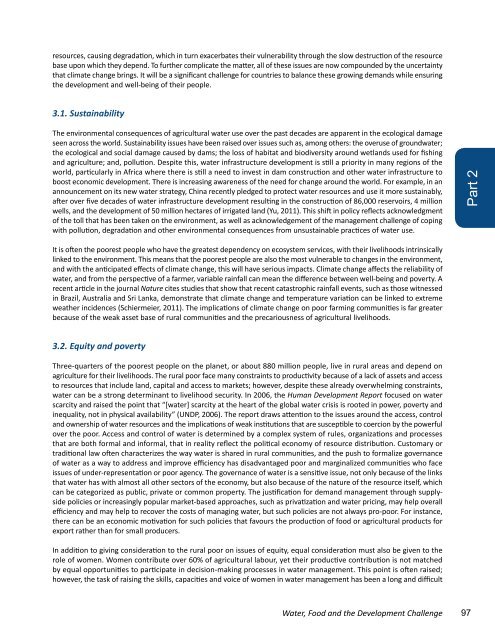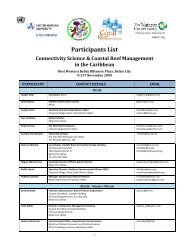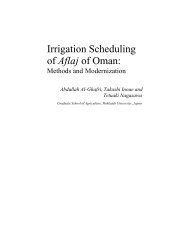The Global Water Crisis: Addressing an Urgent Security - Unu-inweh ...
The Global Water Crisis: Addressing an Urgent Security - Unu-inweh ...
The Global Water Crisis: Addressing an Urgent Security - Unu-inweh ...
You also want an ePaper? Increase the reach of your titles
YUMPU automatically turns print PDFs into web optimized ePapers that Google loves.
esources, causing degradation, which in turn exacerbates their vulnerability through the slow destruction of the resource<br />
base upon which they depend. To further complicate the matter, all of these issues are now compounded by the uncertainty<br />
that climate ch<strong>an</strong>ge brings. It will be a signific<strong>an</strong>t challenge for countries to bal<strong>an</strong>ce these growing dem<strong>an</strong>ds while ensuring<br />
the development <strong>an</strong>d well-being of their people.<br />
3.1. Sustainability<br />
<strong>The</strong> environmental consequences of agricultural water use over the past decades are apparent in the ecological damage<br />
seen across the world. Sustainability issues have been raised over issues such as, among others: the overuse of groundwater;<br />
the ecological <strong>an</strong>d social damage caused by dams; the loss of habitat <strong>an</strong>d biodiversity around wetl<strong>an</strong>ds used for fishing<br />
<strong>an</strong>d agriculture; <strong>an</strong>d, pollution. Despite this, water infrastructure development is still a priority in m<strong>an</strong>y regions of the<br />
world, particularly in Africa where there is still a need to invest in dam construction <strong>an</strong>d other water infrastructure to<br />
boost economic development. <strong>The</strong>re is increasing awareness of the need for ch<strong>an</strong>ge around the world. For example, in <strong>an</strong><br />
<strong>an</strong>nouncement on its new water strategy, China recently pledged to protect water resources <strong>an</strong>d use it more sustainably,<br />
after over five decades of water infrastructure development resulting in the construction of 86,000 reservoirs, 4 million<br />
wells, <strong>an</strong>d the development of 50 million hectares of irrigated l<strong>an</strong>d (Yu, 2011). This shift in policy reflects acknowledgment<br />
of the toll that has been taken on the environment, as well as acknowledgement of the m<strong>an</strong>agement challenge of coping<br />
with pollution, degradation <strong>an</strong>d other environmental consequences from unsustainable practices of water use.<br />
It is often the poorest people who have the greatest dependency on ecosystem services, with their livelihoods intrinsically<br />
linked to the environment. This me<strong>an</strong>s that the poorest people are also the most vulnerable to ch<strong>an</strong>ges in the environment,<br />
<strong>an</strong>d with the <strong>an</strong>ticipated effects of climate ch<strong>an</strong>ge, this will have serious impacts. Climate ch<strong>an</strong>ge affects the reliability of<br />
water, <strong>an</strong>d from the perspective of a farmer, variable rainfall c<strong>an</strong> me<strong>an</strong> the difference between well-being <strong>an</strong>d poverty. A<br />
recent article in the journal Nature cites studies that show that recent catastrophic rainfall events, such as those witnessed<br />
in Brazil, Australia <strong>an</strong>d Sri L<strong>an</strong>ka, demonstrate that climate ch<strong>an</strong>ge <strong>an</strong>d temperature variation c<strong>an</strong> be linked to extreme<br />
weather incidences (Schiermeier, 2011). <strong>The</strong> implications of climate ch<strong>an</strong>ge on poor farming communities is far greater<br />
because of the weak asset base of rural communities <strong>an</strong>d the precariousness of agricultural livelihoods.<br />
3.2. Equity <strong>an</strong>d poverty<br />
Three-quarters of the poorest people on the pl<strong>an</strong>et, or about 880 million people, live in rural areas <strong>an</strong>d depend on<br />
agriculture for their livelihoods. <strong>The</strong> rural poor face m<strong>an</strong>y constraints to productivity because of a lack of assets <strong>an</strong>d access<br />
to resources that include l<strong>an</strong>d, capital <strong>an</strong>d access to markets; however, despite these already overwhelming constraints,<br />
water c<strong>an</strong> be a strong determin<strong>an</strong>t to livelihood security. In 2006, the Hum<strong>an</strong> Development Report focused on water<br />
scarcity <strong>an</strong>d raised the point that “[water] scarcity at the heart of the global water crisis is rooted in power, poverty <strong>an</strong>d<br />
inequality, not in physical availability” (UNDP, 2006). <strong>The</strong> report draws attention to the issues around the access, control<br />
<strong>an</strong>d ownership of water resources <strong>an</strong>d the implications of weak institutions that are susceptible to coercion by the powerful<br />
over the poor. Access <strong>an</strong>d control of water is determined by a complex system of rules, org<strong>an</strong>izations <strong>an</strong>d processes<br />
that are both formal <strong>an</strong>d informal, that in reality reflect the political economy of resource distribution. Customary or<br />
traditional law often characterizes the way water is shared in rural communities, <strong>an</strong>d the push to formalize govern<strong>an</strong>ce<br />
of water as a way to address <strong>an</strong>d improve efficiency has disadv<strong>an</strong>taged poor <strong>an</strong>d marginalized communities who face<br />
issues of under-representation or poor agency. <strong>The</strong> govern<strong>an</strong>ce of water is a sensitive issue, not only because of the links<br />
that water has with almost all other sectors of the economy, but also because of the nature of the resource itself, which<br />
c<strong>an</strong> be categorized as public, private or common property. <strong>The</strong> justification for dem<strong>an</strong>d m<strong>an</strong>agement through supplyside<br />
policies or increasingly popular market-based approaches, such as privatization <strong>an</strong>d water pricing, may help overall<br />
efficiency <strong>an</strong>d may help to recover the costs of m<strong>an</strong>aging water, but such policies are not always pro-poor. For inst<strong>an</strong>ce,<br />
there c<strong>an</strong> be <strong>an</strong> economic motivation for such policies that favours the production of food or agricultural products for<br />
export rather th<strong>an</strong> for small producers.<br />
In addition to giving consideration to the rural poor on issues of equity, equal consideration must also be given to the<br />
role of women. Women contribute over 60% of agricultural labour, yet their productive contribution is not matched<br />
by equal opportunities to participate in decision-making processes in water m<strong>an</strong>agement. This point is often raised;<br />
however, the task of raising the skills, capacities <strong>an</strong>d voice of women in water m<strong>an</strong>agement has been a long <strong>an</strong>d difficult<br />
<strong>Water</strong>, Food <strong>an</strong>d the Development Challenge<br />
Part 2<br />
97




